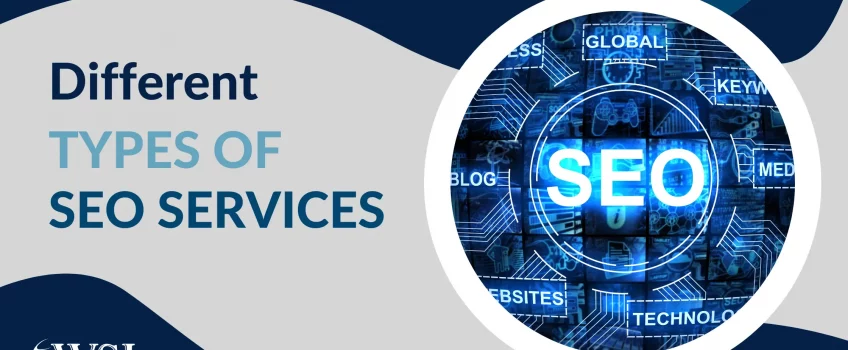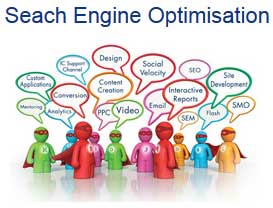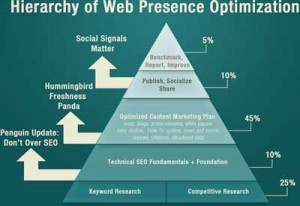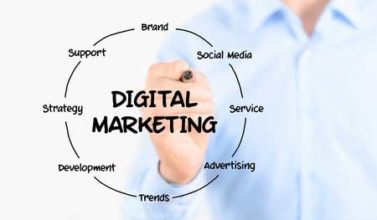
In today’s digital world, it’s crucial for businesses to have a strong online presence, and one of the most effective ways to do that is by utilising SEO services, which include keyword research and competitor analysis. However, there are also many different types of SEO that marketers and business owners should be aware of, including on-page SEO, off-page SEO, technical SEO and local SEO, among others.
If you want to enhance your website’s visibility, increase traffic, and ultimately generate more business, optimising it to rank higher in search engine results pages (SERPs) for targeted keywords or phrases is essential. To maximise your chances of success, it’s crucial that you familiarise yourself with the various types of SEO services that your business may require, and this quick-fire guide provides a good overview.
7 Different Types of SEO & Why Your Business Needs Them
1. On-Page SEO Services
If you want to rank on search engines and attract more traffic, having easily discoverable and comprehensible content on your website is crucial. On-page SEO services focus on optimising your website’s content to meet these requirements. Additionally, Google has emphasised the importance of helpful content, which means that your website should provide relevant information that users find useful.
These services may involve:
- Assigning target keywords to important web pages
- Optimising page titles for those specific keywords
- Updating product descriptions for an online store
- Adding fresh blog content
- Restructuring old articles or service pages
- Using appropriate HTML tags for better content structure
- Developing a comprehensive content plan for each stage of the customer journey.
Without proper targeting of keywords or helpful content, your website may require better on-page SEO services to improve its visibility and attract more traffic. This is something WSI-eMarketing can help with! Visit our Search Engine Optimisation page for more info.
2. Off-Page SEO Services
Off-page SEO services encompass all the various factors that occur outside of your website and can impact your site’s search engine rankings. One critical aspect of off-page SEO is acquiring high-quality backlinks. For example, if you publish an informative article about nut allergies on your website and another reputable site cites it as a source in their study about common food allergies, including a link to your website, that link would be considered a valuable backlink that could significantly boost your SEO.
However, off-page SEO services involve much more than just obtaining backlinks. They also include managing your social media presence, conducting outreach and digital PR campaigns, creating content for platforms like YouTube, managing reviews, and monitoring for spammy backlinks that could harm your search engine optimisation efforts.
3. Technical SEO Services
Technical SEO services are vital for optimising your website’s performance and making it accessible to both search engines and people. This includes improving crawlability, user experience (UX), and site speed so visitors have a seamless time navigating through the pages of your website. In essence, technical SEO is an essential necessity for establishing a successful presence online.
On the other hand, poor technical SEO practices, like slow page loading speeds, broken images and tricky navigation can seriously hinder your site’s user experience.
Facets of technical SEO services include:
- Conducting a technical site audit
- Identifying and correcting duplicate content
- Using robots.txt file to instruct Google on how to crawl your site
- Having a clear sitemap
- Optimising code and file size for faster-loading pages
- Managing a crawl budget
- Migrating a website to another domain
- Ensuring that the site is mobile-friendly
An essential aspect of technical SEO services is making sure that your website is accessible to both humans and search engines. If users cannot navigate to your website’s crucial pages easily, neither can search engines. Therefore, having an efficient and user-friendly site architecture is an example of excellent technical SEO services that benefit both humans and search engines.
4. Local SEO Services
For businesses with a physical location, local SEO is crucial in order to attract customers. Therefore, local SEO is essential and requires different steps than traditional SEO campaigns. One important step is claiming your Google My Business page, which displays relevant information like your name, address, phone number, opening hours, reviews and more on Google Maps and search results.
Optimising this listing with good photos, detailed information, and genuine customer reviews is equally important. Additionally, prominently displaying your contact information with schema markup makes it easier for search engines to show potential customers where you are located.
Other factors that can improve local ranking include embedding a Google Maps marker on your homepage, adding region or city names to page titles, descriptions and keywords, as well as displaying awards and trust symbols. Prioritising local SEO services can help increase visibility among local leads and turn them into paying customers.
Read this blog for more information on Getting Started With Google Business Profiles (Google My Business)
5. E-commerce SEO
E-commerce SEO is an effective strategy for online stores to increase traffic and boost sales. However, optimising an e-commerce site goes beyond updating product titles and descriptions. It can also involve improving brand visibility on external platforms like Amazon or Etsy.
As the e-commerce market is highly competitive, having a top-notch SEO strategy is essential to attract and retain online shoppers. Therefore, prioritising e-commerce SEO services can help businesses stay ahead of their competitors and succeed in the digital marketplace.
6. Mobile SEO
Mobile SEO is crucial for brands to succeed in today’s digital age. One important aspect of mobile search optimisation is ensuring that your website is easily accessible on all platforms.
To achieve this, it’s essential to optimise your code and make sure that the mobile version of your site is fast and user-friendly. Additionally, finding relevant keywords that people are searching for on their mobile devices requires conducting proper mobile keyword research.
It’s important to note that these keywords may differ from those searched on desktops, highlighting the need for a comprehensive mobile SEO strategy. By prioritising mobile SEO services, brands can improve their online visibility and attract more customers through all devices.
7. Video and Image SEO
Video and image SEO refers to optimising videos and images on a website to improve their visibility in search engine results pages (SERPs). This involves using various techniques to make sure that search engines can easily understand the content of videos and images, as they cannot interpret visual content the way humans do.
For video SEO, this can include optimising titles, descriptions, and tags with relevant keywords. It also involves creating high-quality video content that engages viewers and encourages them to share the content. Additionally, optimising video page load times and ensuring that videos are embedded correctly can improve their visibility on SERPs.
Similarly, image SEO involves optimising image file names, captions, alt text, and descriptions with relevant keywords. This helps search engines identify the context of the image and rank it accordingly in search results. Additionally, optimising image file sizes for faster loading times can also help improve their visibility on SERPs.
Overall, implementing effective video and image SEO strategies can help businesses enhance their online presence by driving more traffic to their websites through eye-catching content.
What Is Voice Search SEO?
Voice Search SEO is an essential process for websites wishing to remain at the forefront of search engine optimisation. As virtual assistants such as Google Assistant, Amazon Alexa and Apple Siri become increasingly prevalent, more people are using their voices rather than typing queries into search engines. For example, someone might type “best burgers near me” into a search engine, but they might say “Hey Siri, where can I find the best burgers near me?” when using voice search.
It’s the same question but phrased differently and that means businesses must optimise for voice search accordingly and these few key strategies can help:
- Write content in a conversational tone and use natural language that reflects how people actually speak.
- Voice search queries are often longer and more specific, so optimize for long-tail keywords that reflect this.
- Many voice search results come from featured snippets, so aim to get your content featured in these snippets.
- Most voice searches are done on mobile devices, so ensure your website is mobile-friendly and has a fast loading time.
- Schema markup helps search engines understand the content on your website, making it more likely to appear in voice search results.
SEO Services: Keyword Research
Effective keyword research entails discovering the words and expressions that prospective customers use to find your services or products on the web. By recognising the keywords which are most pertinent to your business, you can improve your website’s material for superior visibility in search engine results pages (SERPs). This includes applying meaningful keywords in web page meta tags, titles, content and image alt text.
By leveraging the right keyword research tools to evaluate search volume, competition, and relevance of different keywords, you can make informed decisions about which ones are worthy of targeting towards your business objectives. This data-driven approach helps ensure that you’re only investing time in terms with potential for success.
SEO Services: Competitor Analysis
Researching your competitors is essential for improving the success of your marketing efforts. When you analyse their content, backlinks, social media presence and advertising campaigns, it provides insight into areas where you can make improvements to your own strategies.
When done right, a competitor analysis gives businesses a leg up when developing digital initiatives that will help them stand out in an ever-growing online space. It could identify areas in where you are underperforming while recognising potential opportunities to increase your visibility and revenue.
How Can WSI-eMarketing Help Improve Your Online Reputation?
At WSI-eMarketing, we offer a range of digital marketing services such as PPC, email marketing, content creation, marketing automation, social media marketing and video marketing. Our team of experts specialises in providing top-notch SEO services to help businesses improve their online visibility and attract more customers.
If you’re looking for a reliable partner to assist you with your digital marketing needs, look no further. Contact us today to request a free consultation, or give us a call at 01453 542761. We are dedicated to helping you find the perfect marketing strategy that will drive success for your business.
Related Post
Top Tips for Product Page...
As the internet evolves and user expectation becomes increasingly sophisticated, creating...
- May 31, 2011
- By Rob Thomas
- e-Commerce
What is SEO?
SEO or Search Engine Optimisation to give it its full name is the process that helps your...
- July 29, 2013
- By Nadine Thomas
- Digital Marketing
5 Ways AdaptiveSEO™ can...
Changes in the world of Search Engine Optimisation (SEO) mean it’s getting harder for...
- March 7, 2014
- By Nadine Thomas
- Content Marketing
Who Needs Digital Marketing?
This post follows on from a LinkedIn post I wrote back in July about works experience. We...
- December 18, 2015
- By Rob Thomas
- Business Growth
Five steps to getting your...
Most content marketers know that posting regular, relevant content is key. It is...
- December 18, 2015
- By Nadine Thomas
- Business Growth
6 Step Guide To Content...
If you’re doing any form of Content Marketing then you need a Content...
- December 18, 2015
- By Nadine Thomas
- Blogging











Leave a Comments